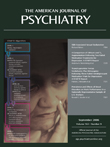Corrections
In the “Practice Guideline for the Psychiatric Evaluation of Adults, Second Edition” (June supplement), the following questions should have appeared in the “Developmental, Psychosocial, and Sociocultural History” domain, instead of the “Legal History” domain:
What are the patient’s cultural, religious, and spiritual beliefs, and how have these developed or changed over time?
Is there a history of parental loss or divorce; physical, emotional, or sexual abuse; or exposure to other traumatic experiences?
What strategies for coping has the patient used successfully during times of stress or adversity?
During childhood or adolescence, did the patient have risk factors for any mental disorders?
What has been the patient’s capacity to maintain interpersonal relationships, and what is the patient’s history of marital and other significant relationships?
What is the patient’s sexual history, including sexual orientation, beliefs, and practices?
Does the patient have children?
What past or current psychosocial stressors have affected the patient (including primary support group, social environment, education, occupation, housing, economic status, and access to health care)?
What is the patient’s capacity for self-care?
What are the patient’s sociocultural supports (e.g., family, friends, work, and religious and other community groups)?
What are the patient’s own interests, preferences, and values with respect to health care?
In the guideline versions available in print format from American Psychiatric Publishing and online through the APA website, the table appears as intended.



